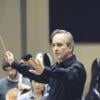
The Philharmonia Baroque Orchestra & Chorale, a San Francisco-based ensemble known for its historically informed performances, released virtual programs from its Jews and Music series on Dec. 1.
Each of the 12 released programs, which explore the legacies of Jewish composers and performers as well as non-Jews who drew inspiration from Jewish art, are available for free online as a “gift to the public in the spirit of Hanukkah,” said Executive Director Courtney Beck.
“[The program] is designed to be a bridge to show the relationships between Jews and non-Jews, and where music has brought us together in times when Jews and non-Jews have sometimes been very much apart,” said Beck, who launched the initiative in 2015. “This is a way to create an inclusive experience for the public.”

The series places prerecorded Philharmonia performances alongside narration by Francesco Spagnolo, a UC Berkeley associate adjunct professor of music and curator of the Magnes Collection of Jewish Art and Life, as well as PBO’s scholar-in-residence for the Jews and Music initiative. It covers an array of topics, ranging from the heroes and villains featured in Handel’s oratorios to the multicultural makeup of music in Italian ghettos.
“We’re bringing a minority perspective on the cultures of the dominant majorities,” Spagnolo said of the series. “We’re doing it with one of the most ancient minorities in Europe, which are the Jews. In doing this, we are interrogating the canon.”
For Spagnolo, Baroque music offers a unique way to rethink music. He is fascinated by the idea of intercultural, interfaith encounters — “a Petri dish of possible cultural contaminations,” he remarked during our interview.
Ghettos, for him, are the perfect example of “music that was almost not supposed to be” — testaments to the unstoppable power of creative power. Designed to control, surveil, and segregate marginalized populations, ghettos in Italy became places of cultural intermingling and places of “incredible creativity” despite all odds.
“The unique format brings Jewish history and often stunning music to life,” said Stephanie Singer, the director of arts and ideas at the Jewish Community Center of San Francisco. “It never fails to delight and challenge our understanding of history at the same time.”
Themes of cross-cultural development continue to resonate to this day, Spagnolo added.
“We’re not just listening to music,” Spagnolo said. “We’re thinking about history and culture and how people come together and live together, whether they want to or they have to.”





